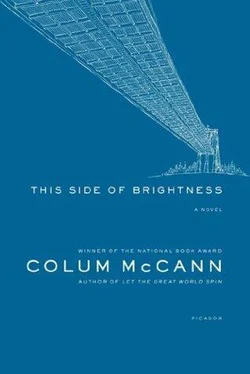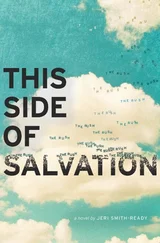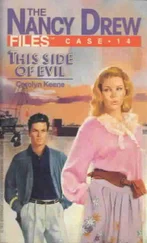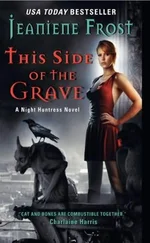Four and a half weeks of relentless ice and snow already. Maybe he should carve the days in notches by the Gulag.
He follows the bend of the highway, walks down to the green benches at the edge of the Hudson.
Ice still on the water and he wonders about his crane, how far it has gone toward the sea. Across the water, New Jersey catches the sunlight.
Angela sits, alone, on the bench. Snow is bellied up around her shoes.
“Heyyo,” he says, but she doesn’t reply.
She has spread a blue plastic bag beneath herself so her clothes don’t soak up the wetness. Treefrog sits on the high back of the bench. He takes Castor and puts her in Angela’s lap, and the cat curls up, contented, as she strokes it.
“Fine morning,” Treefrog says, “fine morning.”
“No it ain’t,” says Angela.
“What’s up?”
“I wanna wash my hair.”
“Let’s go to my nest. I’ll boil some water for you.”
“No way, I ain’t climbing up there.” She pulls her scarf up around her neck. “How come it’s so cold and the sun still shining?”
“Refraction,” he says. “The sun bounces off the snow.”
“Oh, yeah? You’re so clever, ain’t ya? The only thing bouncing off the snow is your bullshit.” But after a moment she says, “You know what? When I lived in that house with the wraparound porch we had hot water all the time. It was red ’cause it had too much iron and I didn’t like to wash my hair ’cause it made my hair stiff and I thought the color’d be funky, but now I wish I could wash my hair in that funky warm water, I’d wash my hair in that funky warm water all day long and night too.”
“It’d be clean, then.”
“It’s clean now, motherfucker!”
“I’m only saying.”
“And I’d wash it in the afternoon too if I had the time.”
Treefrog adjusts the glasses. “Say. Where’s Elijah?”
“Gone to get his SSI. Five hundred bucks a month.”
“Man,” says Treefrog. “He’s got an address?”
“He’s got a friend with an apartment and then they get the money and then they go to the candy store. I hope he keeps me some. He said he’ll keep me some.”
“That stuff’s bad for you,” he says.
She chuckles and looks away.
“Hey, Angela,” he says. “You killed them rats yet?”
“I told you, the pregnant one is pregnant. She’s called Skagerak.”
“Huh?”
“Papa Love told me they’s Norway rats and I asked him for the name of a place in Norway, somewhere like the sea, and he told me Skagerak and Barents, so I called them Skagerak and Barents.”
“You talked to Papa Love?”
“He was out putting the finishing touches on that guy Edison.”
“Faraday.”
“Yeah, yeah, yeah, whatever.”
“And you asked him about rats?”
“Yeah.”
“And you gave ’em names?”
“Yeah, what’s it to you?”
“Now I heard it all.”
“The girl rat is nice. She comes right up beside me. Someday she’s gonna take the bread right outa my hands.”
“Damn.”
They sit in a long silence, him perched high on the back of the bench, watching the slumber of the water.
“The sea looks nice,” she says.
“That’s not the sea, that’s the Hudson. The sea’s down there.”
She purses her lips as if about to kiss the air. “You know what? I always wanted to see the sea. When we were in Iowa, we had a car, Plymouth Volare, a dented piece of shit, you know, and me and my sisters’d be in the backseat, saying, I see the sea and the sea sees me. And my father’d say, We’re going to the sea. But then we’d always run outa gas and he’d kick that dented piece of shit and he’d say, Just a minute. He’d go down the road to get gas — he had a gas can in the trunk — but he’d stop in a bar and that was it. And we’d be in the backseat, singing that stupid song, I see the sea and the sea sees me. Once we tried to walk home through the fields, but the cornstalks were way up above our heads and we was scared and went back to the car.”
“Nothing stopping you from going now to see it, is there?”
“No. I s’pose.”
“You should go see it,” he says. “Take the train to Coney Island, it’s nice out there.”
He moves to sit down on the bench, tugs some of her plastic bag, plants himself beside her, but she looks away. “Hey,” he says, surprised.
She shields her face. “Leave me alone.”
“What happened?”
“Nothing.”
“He hit you, didn’t he?”
“I fell, goddammit, leave me alone.”
“When did he hit you?”
“You’re a pain in the ass, you know that? You’re a pain in the ass bigger than any I ever seen. I’m sitting here getting some quiet, you come along, why the fuck don’t you leave me alone, huh?”
“You should go to a shelter.”
“Ever been in one of them places? They got women with smashed bones and bitten ears and gaps in theys teeth wide enough to drive a D-train through.”
“Why do you stay with him?”
Angela reaches into her pocket and takes out an empty vial with an orange cap, and she twirls it in her hands and smiles.
“You should stay away from that shit.”
“Yessir, Mister Treefrog Preacher, sir.” She sighs. “Elijah didn’t like me giving no name to my rats. Said it’s stupid. Said he’s gonna kill ’em. He’s gonna get some rat poison and make ’em eat it. Maybe even get hisself a cat.”
“He don’t like cats.”
“Now he likes ’em. They just animals like you and me.”
And then Treefrog remembers how once, in springtime — back in the bad days, the worst days — he fell asleep with a piece of bread near his pillow. When he woke up, a rat had taken a small chunk from the top of his right ear. The blood ran down the side of his face and hardened in his beard. He chased the rat to the rear of the nest. There were small brown pellets of rodent shit all over the back of the cave. Treefrog rumbled around in the darkness, so disoriented that he scraped his ear against the wall, and then the cut was filled with black tunnel dust. He cleaned it out with water and gin for disinfectant, tore a strip from a white T-shirt for a bandage, wrapped it around his head and underneath his beard. For days his ear sent jabs of pain through him. He was afraid he might lose his balance. He kept on pinching at the other ear with his fingernail, even pierced the flesh once, but it wasn’t a bad cut. He forgot to change the bandage and Papa Love called him Van Gogh for a while, but the nickname wore off when Treefrog’s ear healed. A month later he caught the rat in a trap beneath his library shelf. It wriggled and squealed under the metal bar that had trapped its body. He bashed its head in with his spud wrench and it let out one last squeal. Treefrog brought the animal topside, dug a small hole in the weed lot down by the river, and buried the rat with great ceremony, just in case it was still using the slice of his ear to listen to the secrets of his mind and body.
“I know what you mean,” he says.
“D’ya think it’s gonna snow again?” Angela asks. And then she looks to the river. “You know what? I had an uncle, he used be able to tell the weather. He could tell a storm from a million miles. He’d stand out in them cornfields and say, A storm’s coming. Or, Sun’s coming. Or, Tornado’s moving in. He looked like the weather. Had a face like the weather. Hey. You think I look like the weather, Treefy?”
“You look like sunshine.”
“You’re cute, Treefy. Excepting sunshine gives you cancer.”
“You sure?”
“It’s a known fact.”
“Gimme a cigarette.”
“Them too. Sunshine and cigarettes.”
She flips the gold clasp on her handbag and delves deep, pulls out half a flattened cigarette, rolls it in her fingers to make it cylindrical once more. He lights it for her and she blows the smoke away from him, but the wind carries it back. She takes five furious puffs, then hands the cigarette to him and Treefrog holds it like a lover. A thought strikes him deep and hard when the smoke touches his lungs.
Читать дальше












